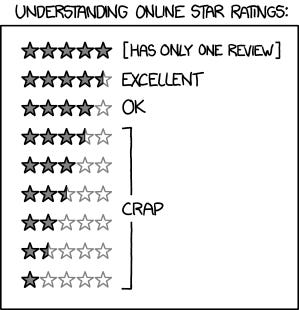Ratings
I have to admit that I'm a non-participating consumer, be it shopping, apps, social media or whatever. I do lookup reviews when buying things however.
Given an option of 5 stars, I would generally assume that the implied meaning would be-
1 star - Unsatisfactory (super buggy or falsely advertised)
2 starts - Needs Improvement (buggy but usable)
3 stars - Baseline product Meets Expectations (works as expected)
4 stars - Exceeds Expectations (works really well and is useful)
5 stars - Distinguished (has more than what I expected and I'm going to recommend this personally)
(This product rating classification should sound similar to your annual performance review with your manager.)
However today ratings are skewed towards 5 stars. I'm not sure if it's American political correctness that has permeated design or some other factor, but the baseline is now very high.
This is a screenshot from the Google play store for apps;
By default you can see all apps based on some algorithm.
Optionally you could search for apps with 4+ stars. But behaviorally that would mean that I want to look for something that is substandard.
So on an android phone I'd expect the 4.5+ stars rating to be the one I use to filter out sub-standard apps.
As a content creator, you're basically hoping that users who think your app meets expectations and higher should give you 5 stars. That leaves you with some buffer for users who do not think your app meets expectations. But as a user or consumer (or maybe just culturally), that feels wrong since there is no distinction between meeting expectations and a distinguished product.
This xkcd comic basically puts ratings into context -
On iOS, searching for apps does not allow you to filter by ratings, but you can see an average of downloads and ratings. It's a very opaque system and I'm not sure if and how they handle new apps for existing categories and other corner cases for inclusion in results. At least the google play store allows filtering for new apps.
Github has a slightly different scoring mechanism. You can star (like equivalent) or if you're using the repository then you will likely fork or watch it. Hence it's usage based rather than ratings which is a strong derivative.
Amazon ratings are critical to sellers as well. Hence there have been quite a few scams to artificially prop up numbers. There is also the bribe mechanism for amazon ratings where you can get a gift card for a favorable rating.
Ultimately ratings and reviews are the metric by which success is defined by multiple platforms. Hence creators are going to change behavior to appease the algorithmic overlords be it subtle, creepy or ultimately illegal. And as a consequence consumer behavior and culture is re-shaped as well.



Same problem with Uber and Ola drivers in India. Ratings are inevitable 5-star. I've also noticed that several delivery workers for Swiggy and Zomato ask for 5-star ratings rather than accepting a tip - guess it is more valuable 😊